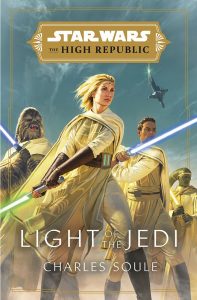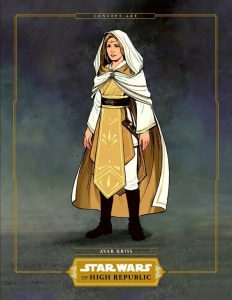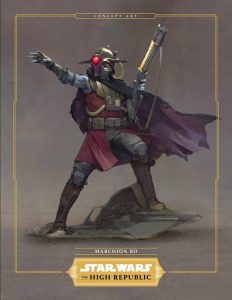Star Wars: Light of the Jedi by Charles Soule – Book Review
Hello, everyone! Filip here, with another (video) review for you, this one
If you prefer text, here’s the written version of the review. It’s lacking in some of the comedic elements of the video; delivery, too, is rather more…dry, as it were!
Published by: Penguin Random House
Genre: Space Opera
Pages: 380 | Audiobook Length: 13 hrs and 35 mins
Format: Audiobook
Purchased Copy: From Audible.co.uk
 Like many, I was hopeful that this new High Republic project might do a great deal to divorce this franchise from what has proved to be a bit of a toxic relationship with the Skywalkers—and when I say this, I’m looking squarely at the Sequel Trilogy, and only occasionally eyeing the Prequels. Onto the book!
Like many, I was hopeful that this new High Republic project might do a great deal to divorce this franchise from what has proved to be a bit of a toxic relationship with the Skywalkers—and when I say this, I’m looking squarely at the Sequel Trilogy, and only occasionally eyeing the Prequels. Onto the book!
Charles Soule pens this opening chapter in The High Republic imprint—when the announcement was made, it went a long way towards building my personal excitement, on account of the excellent Darth Vader series Soule penned between 2017 and 2018. While I thought Kieron Gillen did stunning, unparalleled work with his 2015 series featuring a post-Episode IV Vader, Soule’s take on the eponymous villain proved he could write captivating, layered stories in that Galaxy Far, Far Away.
I had faith in Charles Soule. Having now finished Light of the Jedi, I must admit, that faith has been largely justified; despite having a few issues with Light of the Jedi, this is a splendid addition to the ever-growing canon of the Star Wars universe. Soule has tapped into the magic that is behind this franchise’s staying power, has captured that spirit of the mythos which holds many, like myself, enchanted with this universe. In less than four-hundred pages, he has managed to introduce, define and fully flesh out a generation of new Star Wars characters, many of whom I am beyond excited to read and listen and learn more about. I cannot overstate how brilliant a job Soule has done with the characterization of major Jedi such as Avar Kriss and Elzar Mann, as well as more minor ones like Porter Engle; and of course, many non-Jedis as well, such as the Chancellor of the Republic, Lina Soh. The relationships between Avar and Elzar, but also between Loden Greatstorm and his Padawan, Bell Zetafar, for example, are multifaceted, built on friendship and love and even hints of resentment; each relationship represented carries real weight, which of course does a wonderful job of investing the reader.
 The first quarter of the novel is the epitome of everything I love about space opera sci-fi—incredibly high stakes, a disaster that strikes suddenly and sets up a cataclysmic event, and of course, our band of heroes, both Jedi and normal folks, ready to sacrifice and put everything on the line for the good of all. At once, this opening sets up a tone—which is far darker than what I expected; it establishes stakes—no one is safe, not a captain, not a tech, not a Jedi Master; and it makes a bold statement about how this High Republic is different, really the ideal form of that sad shadow that the Dark Lords of the Sith succeeded in taking over and transforming from the inside. It’s all enclosed within words repeated again and again, “We are the Republic,” which might come across as very corny when read or heard out of context. All the more power to Soule, then, for writing a vast majority of scenes in which this line comes across as natural, and to Marc Thompson, who sells every single utterance.
The first quarter of the novel is the epitome of everything I love about space opera sci-fi—incredibly high stakes, a disaster that strikes suddenly and sets up a cataclysmic event, and of course, our band of heroes, both Jedi and normal folks, ready to sacrifice and put everything on the line for the good of all. At once, this opening sets up a tone—which is far darker than what I expected; it establishes stakes—no one is safe, not a captain, not a tech, not a Jedi Master; and it makes a bold statement about how this High Republic is different, really the ideal form of that sad shadow that the Dark Lords of the Sith succeeded in taking over and transforming from the inside. It’s all enclosed within words repeated again and again, “We are the Republic,” which might come across as very corny when read or heard out of context. All the more power to Soule, then, for writing a vast majority of scenes in which this line comes across as natural, and to Marc Thompson, who sells every single utterance.
The Force is illustrated here much better than just about anywhere else since the original trilogy—at least the Light Side is. Come to think of it, Soule also is the mind behind the astounding way in which Darth Vader’s Force Self is presented, so—two for two on that score for Charles Soule. What the author does here is, he offers our PoV Jedis to visualise the Force in starkly differing ways. For Avar Kriss, the Force is a song; for Elzar Mann, it is, as he self-deprecatingly thinks, “Well, a force,” but in a way that allows him to attempt new and often unsuccessful, occasionally ingenious application of the Force; for yet a different Jedi, the Force is an ocean, much of it penetrated by the light, its depths unknowable darkness. The writer’s efforts in drawing the Force in so many different metaphorical dimensions bears fruit.
The Nihil step into the role of antagonists here – they are pirates, perhaps the nastiest variety of pirates we’ve seen in Star Wars, lacking even a hint of scruples. The name still annoys me a little bit—it comes with all these connotations, both philosophical and in-universe. Nihilists, the Nihil are not, though I suppose the lack of morality and the antithesis of the High Republic’s “We Are all the Republic” message is translated through the name. The Nihilists are not driven by the need to destroy, but rather a more hedonistic impulse twinned with every vice you could think of.
It’s a pet peeve, I’m well-aware of this. It likely bothers five other nerds as much as it bothers me; and even then, it doesn’t bother me enough not to enjoy the antagonism inherent to the role the Nihil play here, but if ‘Jedi’ and ‘Sith’ serve as proof of anything, it is that you can make up group names and imbue them with whatever meaning you have, rather than recontextualise real-world terms, risking humongous nerds like me to write two-hundred words on what is dangerously close to semiotics. Thank you, Ferdinand de Saussure.
As for in-universe intertextuality, we’ve got Darth Nihilus from the brilliant narrative work that is Knights of the Old Republic; he, like most of the Old Republic stuff, was wiped away from canon as soon as the – but I’m sure I’m not the only old hand at this, ever hopeful, ever wistful that the events of that game will be recanonized. I was even worried that the introduction of bacta in the Light of the Jedi implicitly took away the chance that KotoR II: The Sith Lords might ever become canon again, because I thought the Jedi Exile woke up in a bacta tank in the prologue to that game, but I did double check and realized that was actually a kolto tank, which is a different, weaker healing agent than bacta–if none of these words made sense to you, take them as proof of just how nerdy I am.
 Most fascinating in this organization is the Eye of the Nihil, Marchion Ro—who has a great deal of menace about him, punctuated by an excellent delivery of his lines by Marc Thompson. Thompson uses this youthful voice—almost pleasant, if not for the hints of pain and the way he speaks, almost out-of-breath. By the end of Light, Marchion Ro is well and truly terrifying, his motives, nature and true goal will be one of the mysteries lingering over this imprint,
Most fascinating in this organization is the Eye of the Nihil, Marchion Ro—who has a great deal of menace about him, punctuated by an excellent delivery of his lines by Marc Thompson. Thompson uses this youthful voice—almost pleasant, if not for the hints of pain and the way he speaks, almost out-of-breath. By the end of Light, Marchion Ro is well and truly terrifying, his motives, nature and true goal will be one of the mysteries lingering over this imprint,
This novel has such a hopeful tone—despite content that was shockingly dark; perhaps, rather because of it. The light of the Jedi does shine brightest when they face against the deepest shadows, and if the rest of the writers involved in this event do even half so fine a job with this, The High Republic will be a strong outing across the mediums it has embraced.
Marc Thompson’s narration continues to be top-notch. He’s the reason I do not buy physical copies of these books; whenever he narrates one of them, I know I’ll have a dozen hours or over of pure entertainment ahead of me.
I do wish we could’ve gotten another…not even a hundred pages, perhaps another seventy would’ve been enough to expand on a few characters, set up a few sacrifices or losses a little better. For what it’s worth, Soule covers a truly spectacular amount of ground in what he has. It’s a difficult task, setting the foundations of a multi-medium project, which not only has to tell a full story, but it has to introduce a whole swath of characters, plot threads, and conflicts for the other half-dozen authors involved in the High Republic to pursue.
Oh, and here’s my five cents of theory-crafting:
Is it just me, or is Avar Kriss a little too close for comfort to Avarice? In a universe in which the brightest Jedi often plunge to the lowest depths of darkness? I ain’t saying I just figured out who’ll star in The Acolyte, coming to Disney + in three thousand twenty three, but…
